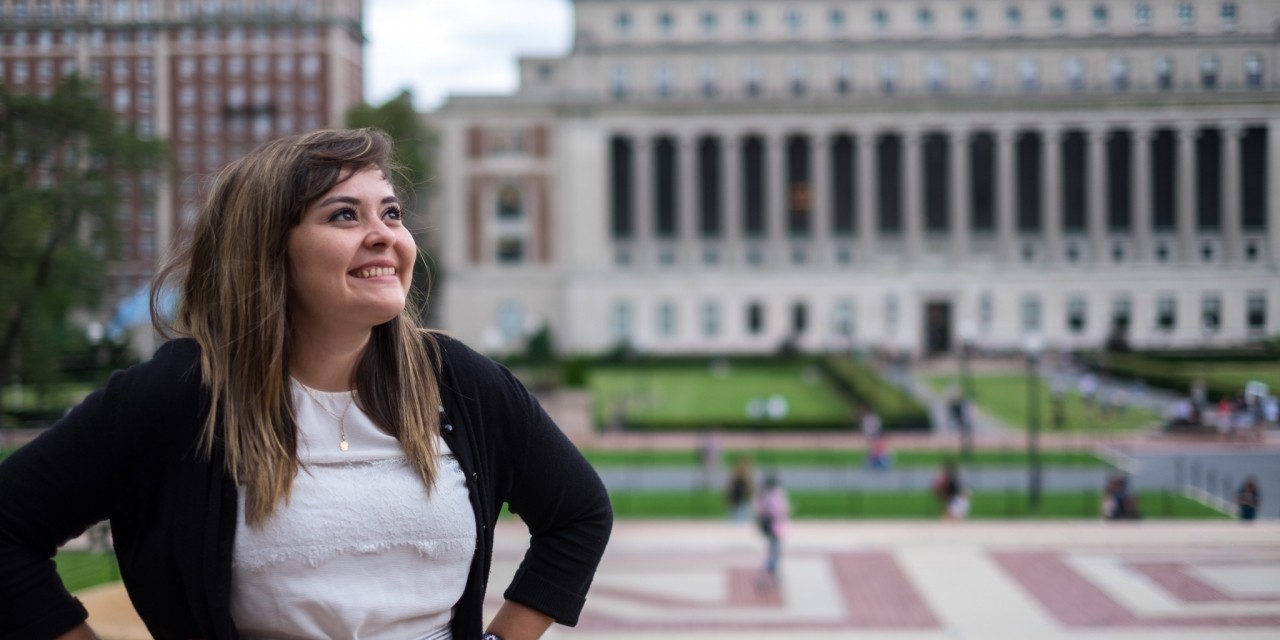OAD Student Spotlight: Ivón Padilla-Rodríguez
In celebration of Latin@ Heritage Month, Isabel Geathers, GSAS’s assistant dean for academic diversity, talks to Ivón Padilla-Rodríguez, a second-year PhD candidate in History, about her research, her family, and the connections between the two.

Isabel Geathers: Welcome, Ivón, and thank you for being here. Why don’t you start by telling us about your research. What are you working on right now?
Ivón Padilla-Rodríguez: I’ve always been interested in the history of immigration. And when I got to Columbia, I realized that there was another field that I was interested in as well: the history of childhood. My research sits at the intersection of 20th-century immigration policies, histories of childhood, and Latino immigration to the U.S. These are super-timely topics; I’m very inspired by the contemporary circumstances. I think migration policies disproportionately and uniquely impact immigrant children, whether they come to the U.S. alone or come within the structure of the family. I’m interested in the experiences of migrant children and how the U.S. immigration regime has perceived them, how it’s treated them, and how it has conceived of childhood in its policy-making.
A lot of that work intersects with work that I do in the community. Here in New York City, I work with legal aid societies through the New York City Mayor’s Office of Immigrant Affairs. I’ve largely worked with The Door, doing translation and providing legal screening services for unaccompanied child migrants from Central America. Most recently, over the summer, I had a research internship with U.S. Citizenship and Immigration Services. I worked for the Office of Policy and Strategy, so I had the opportunity to do a project on global migration and special immigrant juvenile status, which is for undocumented immigrants who have been abandoned or abused and can’t reunite with a parent. I did work that I really enjoyed, and I was able to see how my skills-based training and historical insights are incredibly valuable for immigration policymaking. My own background, I think, has influenced all of the work I do—both the theoretical and the practical.
IG: How has your background has shaped your research?
IPR: My parents are immigrants from Mexico. They came here in the ’80s on tourist visas that they overstayed. They were undocumented for some time when I was a kid. When I was growing up, I was constantly translating for them, I was filling out their immigration forms, I was their accountant—I was their one-stop shop. I had firsthand knowledge of what it is like to live with undocumented parents in this country as a child with U.S. citizenship, and throughout most of my schooling, I think I was most impassioned when I saw the histories and stories from my own background and my family reflected in the textbooks I was reading. So my work is fundamentally an effort to understand my parents’ story of immigration, and I’m fascinated by immigrant families, immigrant children, and undocumented persons. My motivation is both intellectual and personal, but it really was primarily personal.
IG: Now that you’re at Columbia, so far from your family, how do you create a sense of community or belonging? Your work demands that you venture outside of the walls of Columbia and play an active role in the Latino community. Is it difficult to keep that connection alive?
IPR: It’s incredibly challenging while in graduate school to build a community of people that reflects your own experiences, language, politics, and insights. Because graduate school can sometimes feel all-consuming, it can be easier to stay in your apartment, only talk to the people in your program, or live in the library. But I’m lucky: I have my roommate, whom I really appreciate. She is a Latin Americanist in my year. We speak in Spanish at home, we cook and eat Latin foods, and we try to do outings that are cultural in nature. It helps us try to escape the Columbia bubble. For example, we’ll go to Repertorio Español—they do Spanish-language plays. But it’s hard to find the time. The strategy is mostly about finding people around you who share your interests.
